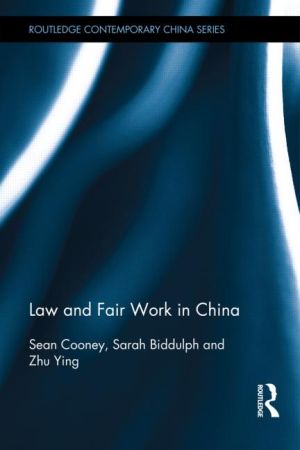
China's economic reforms have brought the country both major international clout and widespread domestic prosperity. At the same time, the reforms have led to significant social upheaval, particularly manifest in labour relations. Each year, several hundred thousand disputes break out over working conditions, many of them violent, and the Chinese state has responded with both legal and political strategies.
This book examines these strategies, focusing in particular on pay and working time, two major causes of labour disputes. An analysis is provided of the creation and implementation of regulatory change throughout the economic reform period, from the mid 1980s until 2010. Chapters assess China's capacity to use law and other regulatory levers to address a major social and economic problem, considering the extent to which the state and other actors have been able to learn from legal and policy failures. The book also examines the response of firms, workers and organisations in China's civil society to the strategies.